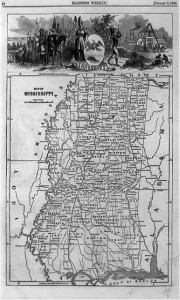This story is said to be from the Cincinnati Gazette of August 8, 1861. It was published in The New-York TimesAugust 18, 1861:
A NEW-YORKER’S EXPERIENCE IN MISSISSIPPI.
LORENZO D. PATRICK, Esq., arrived in this city on Monday last, from Pike County, Miss., whither he was driven on account of his devotion to the Union.
Mr. PATRICK is a native of New-York State. He removed to Mississippi in 1858, and bought 640 acres of timbered land. A short time after his settlement in his new home, he bought a steam saw-mill, which he worked regularly and profitably for more than three years.
On the evening of July 13, while attending to his business in the mill, he was waited upon by a crowd of armed ruffians who demanded him as a prisoner, and took him a short distance to where a “trial” was instituted. The “jury” returned a verdict that he should leave the Southern Confederacy “inside of twenty-four hours.” This he positively refused to do, unless he received in money the value of his property. Finding that he persisted in treating their verdict with contempt, a number of the chivalrous sons of the South waited upon Mr. PATRICK and told him that they would hang him unless he consented to remove. The valiant New-Yorker still held out, and told the waiting committee that he would not leave. The threat to hang him was then ordered to be put into execution. He was taken to the woods and actually hung by the neck with a rope from the limb of a tree, ten feet high. Fortunately, the cowardly vagabonds who desired and attempted his suspension did not know how to adjust the noose, and after letting him hang for three minutes, they concluded he was not going to die, that way, and cut him down. Though much exhausted, Mr. PATRICK was still sensible.
His would-be assassins again gave him a chance to save his life by leaving the Confederacy. Being full sure by this time that they would put their threat into execution, he accepted their offer, and quickly departed for a more congenial clime, leaving his property, valued at $11,000, in charge of a friend. With a great deal of difficulty — undergoing searches and examinations at every stopping place — he found his way to the North, and now stops at the Galt House, in this city. His first act on arriving here was to volunteer his services in a company of cavalry now being raised here. He is determined to fight the enemies of his country, and will make an excellent soldier, being a stalwart six-footer. He will leave the city with his company in a few days. We recommend all persons who are in favor of peace and compromise to him for his opinion in the premises. He never interfered in politics in his life, and especially never avowed sentiments unfavorable to Slavery while he lived in the South.
You can see an image of Cincinnati’s Galt House at University of Cincinnati Digital Press.
The same issue of The New-York Times detailed the more voluntary northward migration of one southern family:
A STEADFAST UNION MAN.
From the Detroit Free Press, Aug. 7.
A span of horses, drawing a somewhat dilapidated looking wagon covered with cotton cloth, made its appearance in the streets yesterday. The singular appearance of the vehicle attracted the attention of the passers and when the driver drew rein and halted on Jefferson-avenue, a crowd quickly gathered around. On inquiry they learned that the name of the owner of the establishment was FRANK NAPIER, a former resident of Shreveport. La. On the culmination of the National difficulties, NAPIER, being a strong Union man, perceived that his residence was too far South to permit him to live on peaceable and quiet terms with his neighbors, and, packing up what portion of his goods he could carry, and taking his wife and three daughters, he left for a more congenial clime. He set out the 25th day of April last, and during the journey himself and family have slept every night in the wagon. He has made his way to this State after the long and tedious journey, in hopes of finding a home among our people, where, by tilling the soil, he can earn an honest livelihood and maintain, unmolested, his loyalty to the Stars and Stripes.


Pingback: Shovel Manufacturer Does His Part | Blue Gray Review